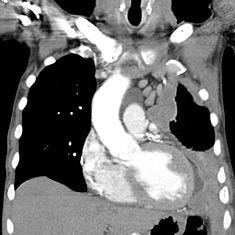New pleural mesothelioma biomarker can speed diagnosis

(image: Wikipedia)
Pleural Mesothelioma Biomarker Fibulin-3: Could It Improve Care?
Pleural mesothelioma (malignant mesothelioma) has a dismally sad prognosis of about a year after diagnosis. Earlier detection of this lethal pleural cancer could conceivably result in earlier treatment and some improvement in life expectancy. Researchers report in the October 11, 2012 New England Journal of Medicine that fibulin-3 levels in plasma and pleural fluid can help differentiate pleural effusions due to pleural mesothelioma from effusions from other cancers and noncancerous causes. Pleural mesothelioma might be detected earlier with the use of fibulin-3, although any survival benefit from malignant mesothelioma, one of the most aggressive cancers, is at this point only hypothetical.
Authors compared fibulin-3 levels in plasma among various patients:
92 patients with mesothelioma,
136 people with asbestos exposure who did not have cancer,
93 patients with pleural effusions not due to mesothelioma,
43 healthy controls.
They also measured plasma and pleural fibulin-3 in patients with pleural effusions:
74 patients who had mesothelioma,
54 with malignant effusions from non-mesothelioma cancers,
39 with benign effusions.
Plasma fibulin-3 had an impressive sensitivity for detecting pleural mesothelioma of 96.7% and a specificity of 95.5% at the cutoff value for abnormal of 52.8 ng/mL of plasma. Plasma fibulin-3 was equally effective at diagnosing early-stage pleural mesothelioma -- 100% sensitive and 94% sensitive using a cut-off of 46 ng/mL, accurately identifying people with early-stage pleural mesothelioma among people with asbestos exposure but without cancer. Fibulin-3 also accurately differentiated pleural mesothelioma from other malignant and benign effusions.
Fibulin 3 is a extracellular glycoprotein in the fibulin family; these proteins are frequently associated with vascular and elastic tissues, and becomes overexpressed in people with pleural mesothelioma. The test is not yet available for wide clinical use as a pleural mesothelioma test.
“There is reason to be encouraged” by the new finding, Pass told Asbestos.com in a recent interview. “Stay tuned. There is a real interest in this research because the real gain will be made by finding it (mesothelioma) earlier, when the treatments can be more effective.”
Harvey I. Pass et al. Fibulin-3 as a Blood and Effusion Biomarker for Pleural Mesothelioma. NEJM 2012; 367; 1417-1427.


